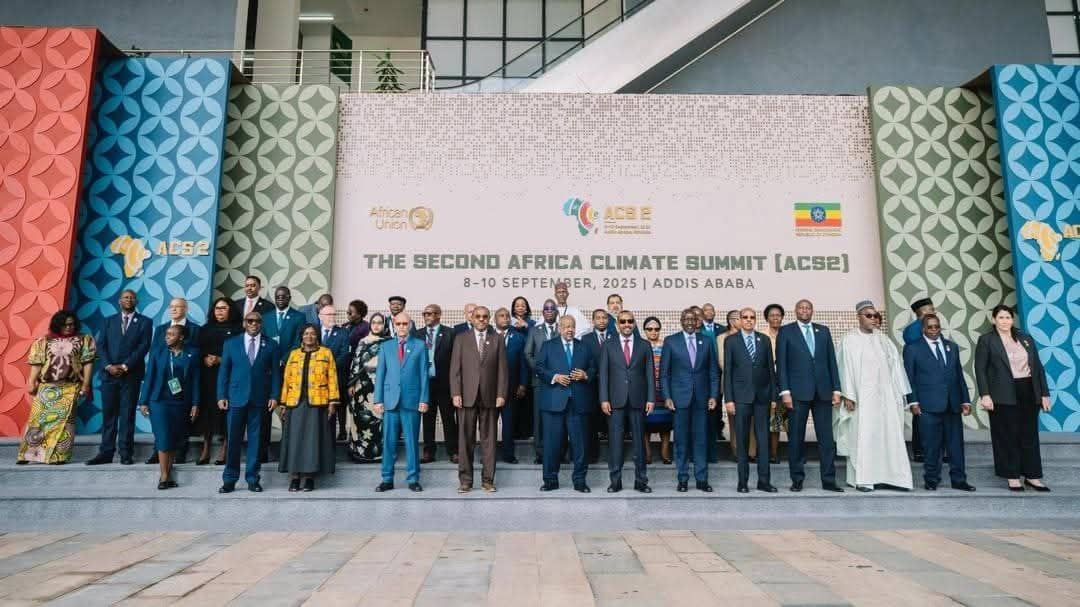0076/HAAC/01-2023/pl/P
Addis Abeba ,Ethiopia
September 8 /2025
Second Africa Climate Summit (ACS2) commenced today in Addis Ababa with a powerful, unified message from continental leaders: the era of rhetoric is over, and the time for action and investment in Africa’s climate solutions is now. Co-convened by the Federal Democratic Republic of Ethiopia and the African Union Commission, the summit aims to reposition Africa from a narrative of vulnerability to a powerhouse of innovation and the epicenter of the next global climate economy.
Held under the theme “Accelerating Global Climate Solutions: Financing for Africa’s Resilient and Green Development,” the gathering brings together Heads of State, government officials, diplomats, and international partners to forge a new path for climate finance and homegrown innovation.
Reframing the Narrative: From Survival to Solutions
In a compelling keynote address, Ethiopian Prime Minister Abiy Ahmed set the tone for the summit, urging a fundamental reframing of Africa’s role in the global climate dialogue.
“Too often, Africa’s story at climate summits begins with what we lack—finance, technology, time. Let us begin instead with what we have,” he declared.
Prime Minister Abiy outlined Africa’s immense, untapped assets:
· A youthful population brimming with creativity and innovation.
· The world’s fastest-growing solar belt.
· Critical carbon sinks in its forests, wetlands, and coasts.
· Vast tracts of arable land with the potential to ensure continental and global food security.
Citing Ethiopia’s Green Legacy Initiative (48 billion trees planted), Climate-Resilient Wheat Initiative, and the renewable energy potential of the Grand Ethiopian Renaissance Dam (GERD), he demonstrated a record of action. “We are not here to negotiate our survival. We are here to design the world’s next climate economy,” he stated, adding, “When Africa’s land heals, when our rivers run clean, and our air is fresh, Africa wins—and the whole world breathes easier.”
In a significant announcement, Prime Minister Abiy presented Ethiopia’s candidacy to host the COP32 climate conference in 2027, positioning Addis Ababa as “Africa’s capital of diplomacy and climate ambition.”
A Demand for Climate Justice and Equitable Finance
Echoing the call for a new paradigm, African Union Commission Chairperson H.E. Mahmoud Ali Youssouf emphasized the urgent need for fairness in climate finance. He pointed to the compounded vulnerabilities faced by African nations due to climate impacts, debt burdens, and structural inequalities in the global financial system.
“The African Union Commission firmly believes that climate finance must be fair, significant, and predictable,” Chairperson Youssouf asserted. He called for a fully-resourced loss and damage fund, the management of carbon credits by an independent supranational body not polluting states and a reformed Green Climate Fund directed toward projects with pan-African impact.
Building on Momentum: Africa as a Source of Solutions
Kenyan President William Ruto, host of the inaugural summit in Nairobi, applauded Ethiopia for building on the momentum established in 2023. “In Nairobi, we introduced a bold new perspective of Africa as a continent of opportunity and solutions, not merely a victim,” President Ruto said. “We framed climate action not as a burden, but as a driver of economic growth, transformation, and job creation.”
While highlighting Africa’s progress in green infrastructure and renewable energy, he issued a stark warning against isolationism. “No nation can solve this crisis alone. Only bold, united, and sustained collaboration can avert climate catastrophe.”
The Addis Ababa Proposal: The African Climate Innovation Compact
Looking to the future, Prime Minister Abiy proposed a groundbreaking continent-wide framework: the African Climate Innovation Compact (ACIC). This ambitious partnership aims to unite universities, research institutions, startups, and communities to deliver 1,000 scalable African climate solutions by 2030.
Structured around five pillars nnovation discovery, financing, knowledge development, policy enablement, and public engagement the ACIC is designed to be backed by a blended financing model targeting $50 billion annually. Its objectives are to:
· Strengthen renewable energy, agriculture, and water security.
· Advance biodiversity conservation and build resilient cities.
· Create millions of green jobs and stimulate economic growth.
· Position Africa as a net exporter of climate solutions.
A Symbol of Unity for the Future
The summit’s official opening featured a symbolic tree-planting ceremony at the Addis Ababa International Convention Center. Heads of State and dignitaries planted trees as a living testament to African solidarity and an unwavering commitment to ecosystem restoration for future generations.
Emebet Asefa, Correspondent
Addis Abeba ,Ethiopia





